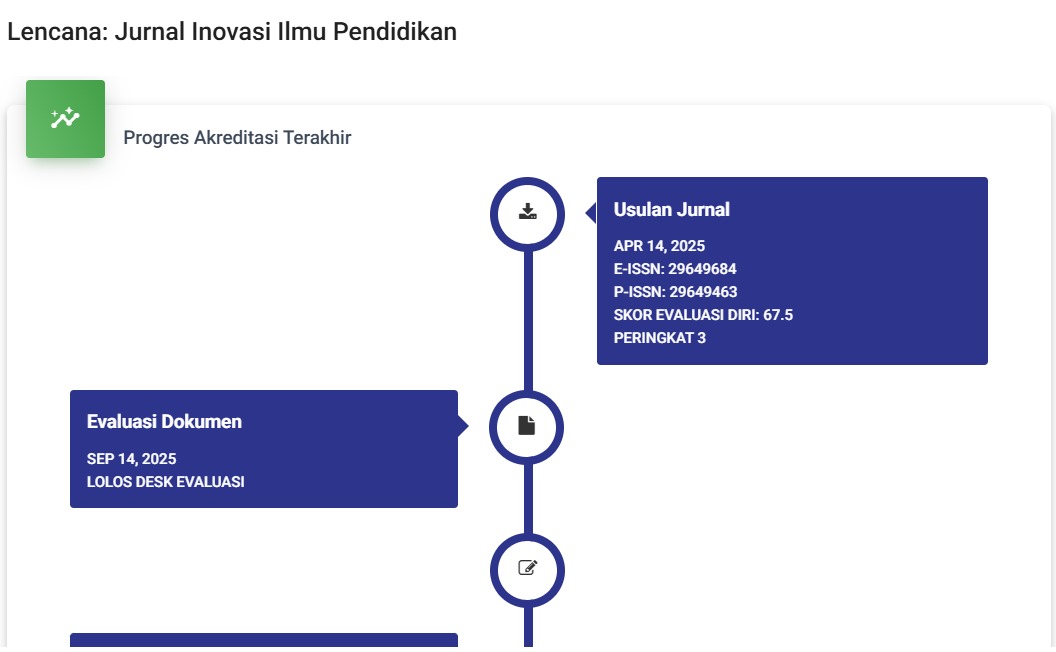Dampak Konten Bertema Psikologi Dalam Media Sosial TikTok Terhadap Fenomena Self Diagnose Pada Generasi Z
DOI:
https://doi.org/10.55606/lencana.v2i4.4063Keywords:
TikTok Social Media, Self Diagnose, Generation ZAbstract
The rapid advancement of technology in the era of globalization has been accompanied by the emergence of various social media, one of which is TikTok social media. TikTok is a social platform focused on music videos that was first introduced in September 2016. Currently, 76% of TikTok users are dominated by generation Z. All types of video content on TikTok include psychology-themed content, which can lead to the phenomenon of self-diagnosis after viewing the content. The purpose of this study is to determine the impact of psychology-themed content in TikTok social media on generation Z. This research uses a qualitative descriptive approach method. The results of this study indicate that the phenomenon of self-diagnosis has an impact experienced by the subject, such as the subject experiencing interference in carrying out daily activities, the subject will search for additional information related to the symptoms experienced through digital media, the subject feels that his energy has decreased, the subject experiences a decrease in mood, and is easily emotional. In addition, in this study, researchers found that the phenomenon of self-diagnosis has a positive impact, namely the subject after doing self-diagnosis feels more empathetic with other individuals. The findings of this study are expected to not only enrich the academic literature, but can provide insight for generation Z to be more selective in choosing psychology-themed content, so as not to create a tendency to self-diagnose.
Downloads
References
Aaiz, A., & Stephen, S. (2017). Self-diagnosis in psychology students. International Journal of Indian Psychology, 4(2). https://doi.org/10.25215/0402.035
Aji, W. N. (2018). Aplikasi TikTok sebagai media pembelajaran bahasa dan sastra Indonesia. Universitas Widya Dharma Klaten, 431, 136.
Annury, U. A., Yuliana, F., Aufara, V., Suhadi, Z., Sekar, C., & Karlina, A. (2022). Dampak self diagnose pada kondisi mental health mahasiswa Universitas Negeri Surabaya. 481–486.
Berindra, M. S. (2023). Bijak mendiagnosis diri sendiri. Kompas. https://www.kompas.id/baca/muda/2023/06/10/bijak-mendiagnosa-diri-sendiri
Gumara, A., Muthmainah, B., & Prameswari, A. S. (2023). Kecemasan pada mahasiswa pengguna TikTok yang melakukan self diagnose. 1(1), 69–80.
Harwood, E. (2022). TikTok, identity struggles and mental health issues: How are the youth of today coping? 1–9.
Humaida, R., Munastiwi, E., Irbah, A. N., & Fauziah, N. (2022). Strategi mengembangkan rasa percaya diri pada anak usia dini. Kindergarten: Jurnal Pendidikan Anak Usia Dini Indonesia, 1(2), 1–15.
Kasmantoni, K., & Putra, P. P. (2023). Analisis perspektif kritis generasi Z terhadap wacana pada media sosial. Diglosia: Jurnal Kajian Bahasa, Sastra, Dan Pengajarannya, 6(3), 681–696. https://doi.org/10.30872/diglosia.v6i3.698
Maskanah, I., Psikologi, P. S., Islam, U., Sunan, N., & Djati, G. (2022). Fenomena self-diagnosis di era pandemi COVID-19 dan dampaknya terhadap kesehatan mental the phenomenon of self-diagnosis in the era of the COVID-19 pandemic and its impact on mental health. 1(1), 1–10. https://doi.org/10.15575/jops.v1i1.17467
Meizara, E., Dewi, P., Sari, R., Lestari, D. R., Nurfath, M., & Ma, M. (2022). Psikoedukasi self diagnose: Kenali gangguan anda sebelum menjudge diri sendiri. Pengabdi, 3(1), 19–26.
Nugraha, M. T. A. Y. P. H. S. A. N. A. F. (2023). Diagnose of mental illness using forward chaining and certainty factor. 20(2), 63–70.
NurulAzizah, N. (2023). Bijaklah dalam mengakses konten berbau psikologi. Kompasiana. https://www.kompasiana.com/nasywaazizah/6462dcc55479c370714630d2/bijaklah-dalam-mengakses-konten-berbau-psikologi
Rahmah, F. A., & Khasanah, I. (2023). Kreativitas generasi Z menggunakan bahasa prokem dalam berkomunikasi pada aplikasi TikTok. Diglosia: Jurnal Kajian Bahasa, Sastra, Dan Pengajarannya, 6(3), 827–840. https://doi.org/10.30872/diglosia.v6i3.675
Rizkika, E., Fitriana, D., Sa’adati, T. I., & Afandi, A. (2023). Proceeding the 2nd international seminar of multicultural psychology (ISMP 2nd) Faculty of Psychology Universitas 17 Agustus 1945 Surabaya analysis of self-diagnosis rates in the early adult age range. 2023, 313–318.
Sadida, S. (2021). Fenomena self-diagnosis kesehatan mental remaja generasi Z di media sosial. 7–33.
Sasongko, Y. A. T. (2019). Video pendek jadi lebih menarik dengan fitur TikTok ini. Detik. https://inet.detik.com/cyberlife/d-4788614/video-pendek-jadi-lebih-menarik-dengan-fitur-tiktok-ini
Sekar Arum, L., Zahrani, A., & Duha, N. A. (2023). Karakteristik generasi Z dan kesiapannya dalam menghadapi bonus demografi 2030. Accounting Student Research Journal, 2(1), 59–72. https://doi.org/10.62108/asrj.v2i1.5812
Sumarni, T. S., & Nursanti, S. (2022). Intensitas pengguna media sosial Instagram terhadap minat fotografi generasi Z Indonesia. 16(10), 7639–7646.
YPulse. (2023). Gen Z is officially using TikTok more than any other social media platform. YPulse. https://www.ypulse.com/article/2023/06/05/gen-z-is-officially-using-tiktok-more-than-any-other-social-media-platform
Downloads
Published
How to Cite
Issue
Section
License
Copyright (c) 2024 Lencana: Jurnal Inovasi Ilmu Pendidikan

This work is licensed under a Creative Commons Attribution-ShareAlike 4.0 International License.








